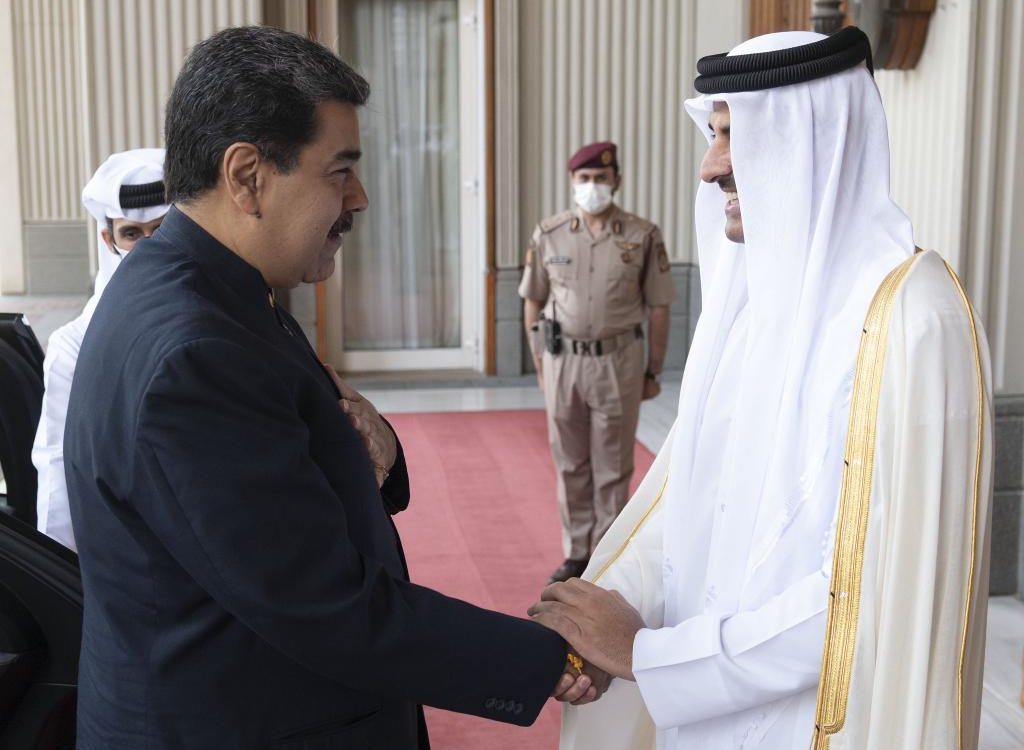Shortly after the elections’ results were out, the United States’ Secretary of State Antony Blinken said Washington had “serious concerns” about the results not reflecting the Venezuelan people.
Qatar’s Amir Sheikh Tamim bin Hamad Al-Thani has congratulated Venezuela’s President Nicolas Maduro on his re-election on Sunday, which came after securing 51 percent of the votes against opposition candidate Edmundo Gonzalez.
“I congratulate the President of Venezuela, Nicolas Maduro, on his re-election to a new presidential term, and I wish him success[…]and for his friendly people continued prosperity, progress and peace,” Sheikh Tamim said in a post on X on Monday.
“Looking forward to our joint work to strengthen our bilateral relations in all fields,” the Qatari leader added.
Qatar’s Shura Council had also joined international bodies and organisations in monitoring Venezuela’s presidential elections.
According to Doha’s state news agency (QNA), the Shura Council was represented by its member, Sultan bin Hassan Al Dhabet Al Dosari, who is also the head of the Qatari Parliamentary Friendship Group with Latin American and Caribbean countries.
Maduro, 61, declared victory during the presidential elections against Gonzalez, describing his win as a victory for Venezuela’s peace. He had first won the presidency in 2013 following the death of former president Hugo Chavez from cancer.
“The voice of peace triumphed, and in Venezuela there will be peace, peace and peace for our country,” Maduro said in his victory speech on Monday.
Opposition figure and former national assembly member Maria Corina Machado rejected the elections’ result, describing it as “an outrage against the truth” while claiming that the polls had indicated Gonzalez’s victory.
Corina Machado said Gonzalez won 70 percent of the vote.
“We want the whole world to know that we won in every sector and every state in the country. We know what happened today. We’ve been making sure all the information was collected and reported. This shows the results. It is irrefutable,” she told a rally.
Maduro’s win was also met with a divided response between different governments, some which welcomed his re-election and others who expressed their skepticism.
Shortly after the elections’ results were out, the United States’ Secretary of State Antony Blinken said Washington had “serious concerns” about the results not reflecting the Venezuelan people.
“We have seen the announcement just a short while ago by the Venezuelan Electoral Commission,” he said in Tokyo. “We have serious concerns that the result announced does not reflect the will or the votes of the Venezuelan people.”
Blinken also called on the electrical authorities to publish the full detailed results transparently.
“It’s critical that every vote be counted fairly and transparently, that the electoral authorities immediately share information with the opposition and independent observers without delay and that the electoral authorities publish the tabulation of votes,” he said.
Other countries that were outraged by the results included Peru, Chile and Costa Rica.
Peruvian Foreign Minister Javier Gonzalez-Olaechea announced that his country recalled its ambassador to Venezuela over the election results. In a post on X, he condemned “the sum of irregularities with the intention of fraud”.
Meanwhile, leaders from Cuba, Honduras and Bolivia congratulated Maduro.
U.S.-Venezuela tensions
Venezuela’s latest presidential elections took place following a deal between the government and opposition last year, prompting the U.S. to ease sanctions imposed on Maduro following his re-election in 2018.
During the same year, tensions between the U.S. and Venezuela soared under the former Donald Trump administration. At the time, Washington imposed sweeping sanctions on the South American country in a bid to exert maximum pressure on President Maduro.
In 2019, Maduro severed diplomatic ties with the U.S. after it recognised opposition leader Juan Guaido as the interim president amid rising tensions between the two countries.
Seasoned Gulf mediator, Qatar, had stepped in to hold talks between rivals the U.S. and Venezuela last year, resulting in a prisoner exchange deal between both sides last December.
The exchange involved 10 American prisoners for one Venezuelan prisoner, Alex Saab, a close ally of President Maduro. This came after reports last October pointed to meetings between the U.S. and Venezuelan sides.
A report by The Miami Herald at the time said quiet negotiations took place in Doha between Washington and Caracas resulting in a “tentative agreement” for free and fair elections in Venezuela.
Earlier this month, Maduro confirmed accepting a proposal to resume direct talks with the U.S. in a bid to lift the crippling sanctions on his country.
In an interview with Venezuela’s state television on July 1, Maduro said he had “received the proposal during two continuous months” from Washington to resume talks facilitated by Qatar.







